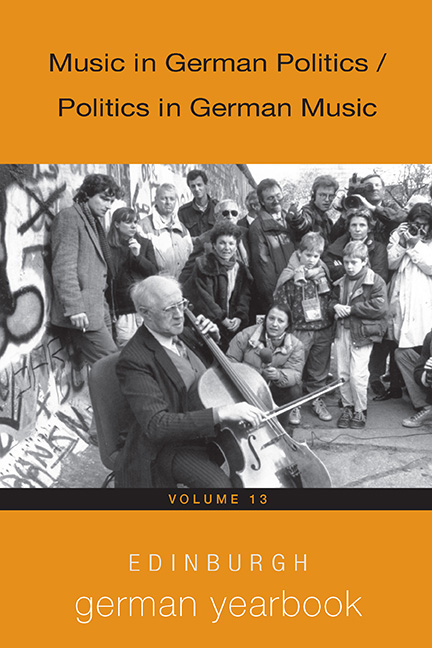Martin Luther in Nineteenth-Century Music, Literature, and Politics
Published online by Cambridge University Press: 26 May 2022
Summary
FOUR MONTHS AFTER the Proclamation of the German Empire, in the presence of the newly crowned emperor, Richard Wagner took to the stage at the court opera in Berlin to conduct the Kaisermarsch (WWV 104) that he had composed to glorify the accession of Wilhelm I to the throne. “Ausgerechnet Richard Wagner,” the musicologist Sabine Giesbrecht notes, “der in dem ‘Kartätschenprinzen’ von 1848 nicht gerade das Ideal eines Monarchen sah, verfaßt in einer sich überschlagenden Sprache einen Kaisermarsch mit angefügtem Volksgesang, in den alle einstimmen sollen: ‘Heil! Heil dem Kaiser! König Wilhelm!’” (Richard Wagner of all people, who did not exactly consider the “gunhappy prince” of 1848 an ideal monarch, this Richard Wagner pens an effusive imperial march with its final popular chorus, expecting all to join in: “Hail! Hail the Emperor! King Wilhelm!”; example 1). It seems a far cry indeed from the Wagner of 1849 who, from the bell tower of the Kreuzkirche, had provided the insurgents of the May uprising in Dresden with intelligence on the movement of government troops. On the surface, it seems that two decades later the composer had abandoned the ideals of the March Revolutions—the struggle for political participation and national unification—in exchange for imperial pipe dreams and royal favor.
The music of the Kaisermarsch, however, reveals Richard Wagner's ongoing commitment to the political agenda of the influential German middle classes. The integration of a male-voice choir is a case in point, as men's singing associations had become a bulwark of the national-liberal movement over the course of the nineteenth century. The imitation of sacred musical traditions in the Kaisermarsch is equally telling: this practice had also evolved into a popular expression of nationalist sentiment. Above all, however, it is the prominent citation of the Lutheran chorale “Ein feste Burg ist unser Gott” (A Mighty Fortress is Our God; example 2) that aligned the Kaisermarsch with the political goals of the March Revolutions.
The reference to Luther is certainly a nod to the Protestant tradition of the House of Hohenzollern, but this connection had lost much of its appeal during the Enlightenment. It was the emerging national-liberal movement, rather than the Prussian monarchy, that resurrected and laid claim to the Lutheran heritage in this era of the burgeoning middle classes.
- Type
- Chapter
- Information
- Edinburgh German Yearbook 13Music in German Politics/Politics in German Music, pp. 19 - 34Publisher: Boydell & BrewerPrint publication year: 2022



